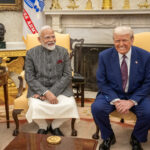India signaled on August 6, 2025, it would take “all actions necessary” to protect its national interests after Washington moved to double tariffs on Indian goods to 50 percent in retaliation for New Delhi’s continued purchase of Russian oil.
The Ministry of External Affairs (MEA) condemned the decision as “unfair, unjustified and unreasonable” and left the door open to countermeasures, saying it would safeguard the economic and strategic interests of 1.4 billion Indians.
“We reiterate that these actions are unfair, unjustified and unreasonable. India will take all actions necessary to protect its national interests,” the MEA said in a statement, stopping short of announcing immediate retaliation but making clear the option remains on the table.
The U.S. measure, an additional 25 percent levy on top of an existing 25 percent duty, will take effect on Aug. 27 and apply to almost all Indian imports, from textiles and leather to machinery and engineering goods. President Donald Trump said the move was aimed at addressing a “national emergency” over Russia’s war in Ukraine, arguing India’s oil trade with Moscow helps “fuel the war machine.”
Export hit looms
India exported $86.5 billion worth of goods to the United States last year, its largest single-country market. Export bodies warn that the higher duties could slash U.S.-bound shipments by 40–50 percent as buyers switch to cheaper suppliers.
“This move is a severe setback for Indian exports, with nearly 55 percent of our shipments to the U.S. market directly affected,” said S.C. Ralhan, president of the Federation of Indian Export Organizations (FIEO). “Margins are already thin, and this additional blow could force exporters to lose long-standing clients.”
Ajay Sahai, FIEO’s director general, said many MSME-led sectors were already seeing orders put on hold. “Absorbing this cost escalation is simply not viable for most exporters,” he said.
Double standards charge
The Global Trade Research Initiative (GTRI), a Delhi-based trade policy think tank, accused Washington of “hypocrisy,” noting that China bought $62.6 billion worth of Russian oil in 2024—more than India’s $52.7 billion—yet faces no such penalties.
“Washington avoids targeting Beijing because of China’s leverage over critical materials such as gallium, germanium, rare earths and graphite, which are vital for U.S. defense and technology,” GTRI said.
It added that U.S. allies have continued substantial trade with Russia and the European Union. They imported $39.1 billion of Russian goods last year, including $25.2 billion in oil, while the United States itself bought $3.3 billion in strategic materials from Moscow.
Strategic posture hardens
Diplomats and analysts say the latest U.S. move could harden India’s resolve to conduct energy and trade policy on its own terms.
India has argued that its Russian oil purchases are driven by market conditions and national energy security needs, especially after European buyers diverted Middle Eastern supplies to replace sanctioned Russian flows. Officials have stressed that capitulating to U.S. pressure would set a precedent for further coercive measures.
“In fact, India began importing from Russia because traditional supplies were diverted to Europe after the outbreak of the conflict,” the MEA said. “It is revealing that the very nations criticizing India are themselves indulging in trade with Russia.”
Calculated patience, but no surrender
Trade strategists say New Delhi may initially avoid immediate retaliation to keep diplomatic channels open but will prepare a calibrated response if the economic pain deepens.
“India could think of not buying Russian oil if economically viable, but it should not abandon Russian oil purchases simply to satisfy Washington,” GTRI said. “The U.S. may find a new pretext to tax India again.”
Options include raising duties on select U.S. products, slowing market access in sectors like agriculture and e-commerce, or aligning more closely with alternative trade blocs.
For now, officials are signaling a wait-and-watch approach while making clear that sustained pressure from Washington will trigger a measured but firm response.
As one senior trade negotiator put it: “We will not be rushed into a knee-jerk reaction, but safeguarding India’s economic sovereignty is non-negotiable.”






